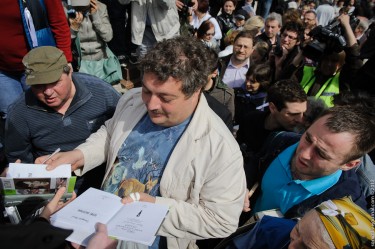Novaya Gazeta, one of Russia’s oldest opposition papers, has implicated Vladimir Putin’s favorite restaurant owner, Evgeny Prigozhin, in a bizarre scheme to defame several of the country’s most prominent news publications. According to Novaya, Prigozhin’s Kremlin-connected [ru] catering company, “Concord,” has been involved in an elaborate conspiracy to plant false information in different Russian newspapers, disguised as advertisements, in order to convince the public that the news is for hire.
Novaya’s June 19, 2013, exposé [ru], written by Nina Petlyanova, goes into great detail about the plot against Russia’s free press, unearthing travel records (complete with passport information), leaked internal memos, and arcane connections between different individuals. More than once in the article, Petlyanova reports that her newspaper has obtained certain revealing documents to support her charges against Prigozhin. In a section titled “Masha Hari” (a play on Mata Hari), readers learn that Concord-connected muckraking journal “GoG” apparently sent a spy to work on Novaya’s editorial staff, though Novaya seems to have converted her into a double agent, granting the paper access to the materials mentioned above.
Many comments on Novaya’s website praised Petlyanova’s thorough investigative work. Reacting to Novaya’s counter-espionage tactics, however, some readers seemed to roll their eyes. In one response to the story, Alexey Burtsev wrote:
Одна газета заслала в редакцию другой супер.шпионку Машу, а еще Майорова и Михайлов часто вместе летали самолетами Аэрофлота… просто какой-то несерьезный детский сад!
One newspaper sent to the other some little super spy, Masha, and also Maiorov and Mikhailov [two other individuals linked to GoG] often flew together on Aeroflot planes… it’s all just some unserious childishness!
Another reader, Evgeny Komarov, also took issue with Novaya’s “Masha Hari”:
То есть у НГ свои шпионы в Конкорде! Поздравляем, шпионские страсти в разгаре. Честно говоря, вся эта возня дискредитирует ОБЕ стороны – шпионаж с независимой журналистикой плохо вяжутся.
So that means that Novaya Gazeta has its own spies in Concord! Congratulations. Spy fervor is now in full gear. Honestly, this whole racket discredits BOTH sides. Espionage doesn’t go well with independent journalism.

Dmitri Bykov at the “Control Stroll” opposition rally in Moscow, 13 May 2012, photo by Evgeniy Isaev, CC 2.0.
One of the more curious episodes in the campaign against the Russian free press doesn’t actually involve a newspaper, but one of Russia’s best known writers and poets, Dmitri Bykov. In late February, earlier this year, the muckraking “Newspaper about Newspapers” (or “GoG,” mentioned above), ran a story [ru] about Bykov traveling to a town outside Sverdlovsk, allegedly to endorse a local businessman’s run for political office, for a fee of $15 thousand. GoG published materials from someone named Sergei Solovev, the same businessman man who hired Bykov to come to Sverdlovsk, sent on February 23, just hours after the poet’s performance. Solovev claimed that his campaign was a sham—intended merely as a prank to test whether he could hire a prominent oppositionist as a mercenary supporter.
With little delay, Maxim Ivanov, a deputy in Sverdlovsk’s Legislative Assembly, announced [ru] on his LiveJournal that he was calling on local investigators to verify that Bykov had paid the necessary taxes on his honorarium. Following the blog post, Bykov himself posted the first comment [ru], denying that he had endorsed Solovev’s political campaign and insisting that he always pays taxes on his honoraria. (In statements elsewhere [ru], Bykov has pointed out quite reasonably that the law does not require citizens to pay such taxes the same instant that they receive their income.) Undeterred and perhaps a bit irked by the comment’s tone, Ivanov responded [ru], suggesting that Bykov is a dishonest man, and promised to see through his appeal to investigators. On May 7, 2013, a local newspaper confirmed [ru] that Sverdlovsk’s Investigative Committee had opened a case regarding Bykov’s earnings.
Ivanov wasn’t the only attack dog unleashed after GoG’s “revelations.” There is evidence that someone activated a bot network to propagate the story, as LiveJournal and Twitter are littered with short posts embracing the hashtag “#ПродажныйБыков” (Corrupt Bykov). On February 28, 2013, YouTube user Artem Simonov also published a video [ru] against Bykov (which GoG reposted), repeating Solovev’s accusations. The video, which features inaccurate, misleading subtitles, is Simonov’s only content uploaded to YouTube. The clip has almost 300 thousand views, but nearly all occurred within a single week, and virtually no one has watched the montage since. Other prominent regime-friendly bloggers, like Kristina Potupchik and LJ user Fritzmorgen [ru], also promoted the story.
On Facebook and LiveJournal [ru], Bykov and his fans have posted materials refuting the poet’s critics. With Novaya Gazeta’s revelations, they now have fresh ammunition against his accusers, though the revealed scale of the defamation campaign against Bykov and several Russian newspapers is a new threat altogether.








8 comments
Приглашаем Вас ВС займа компании (США). Заинтересованы ли вы в обеспеченный кредит для личного или коммерческого использования. Мы даем кредит с процентной ставкой 3%. Мы предоставляем кредит в США $ 5,000.00 USD минимум USD $ 200,000,000.00. свяжитесь с нами по телефону (sunloancompany@fastservice.com) для получения дополнительной информации
We are a Reputable, Legitimate & an accredited money Lender. Do you
have a bad credit or are you in need of money to pay bills, I give out
loans to individuals and companies in need of financial assistance. (No
social security
and no credit check, 100% Guaranteed! 3% interest rate ) Please write
back if interested. You reach us via e-mail:
creditplusloancompany@yahoo.com.sg
We are a Reputable, Legitimate & an accredited money Lender. Do you
have a bad credit or are you in need of money to pay bills, I give out
loans to individuals and companies in need of financial assistance. (No
social security
and no credit check, 100% Guaranteed! 3% interest rate ) Please write
back if interested. You reach us via e-mail:
creditplusloancompany@yahoo.com.sg